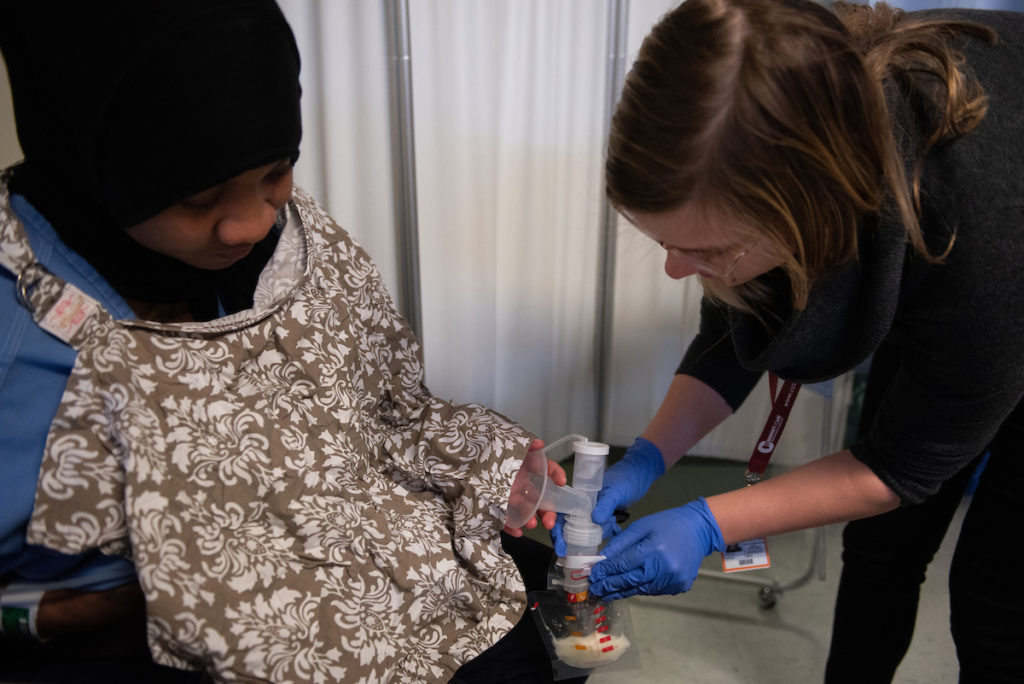Breastfeeding in Riverside: Meet 3 moms who pump in jail
 February 5, 2019
Category: Featured, Long, Purpose
February 5, 2019
Category: Featured, Long, Purpose
Editor’s note: The full content of this article was written by reporter Malcolm Burnley and originally appeared at Next City. This portion appears here as part of the Broke in Philly reporting series.
Warden Nancy Giannetta, clutching a dense ring of keys, gets buzzed through a series of security doors and into Unit G of Riverside Correctional Facility, a county jail for women in Philadelphia.
It’s a Thursday afternoon in January when Giannetta greets three uniformed guards on her way to the back of the unit, where there’s a room with a turquoise door and windows shielded from the inside by a curtain.
“Ladies, you can resume your activities, just try to stay out of the way,” says Giannetta, who untangles a key to unlock a room no bigger than a few standard cells.
Inside are folding tables, plastic chairs, a cooler, and the low-pitched, electrical hum of a hospital-grade breast pump. It’s where Cierra Jackson pumps according to her specifications, three times a day, under the direction of a doula and a nurse.
“They gave me a book on breast-pumping and it was telling me that the breast milk has antibodies,” Jackson says. “It’s very helpful for the baby, keeping them smart and healthy. I did not know until I read the book. I never breastfed before — I never wanted to.”
Jackson is one of six mothers at Riverside who are currently participating in the lactation program, one of the first of its kind inside an American jail. Women who give birth just before or during their time here are given access to breastfeeding education and the facilities of the lactation room, plus additional hand pumps and milk storage bags to keep within their cells. Case managers from a local nonprofit transport the mothers’ milk directly to their babies on the outside, returning to the jail with pictures and updates.
[Read Generocity’s Q&A with Maternity Care Coalition Director of Behavioral Health Colette Green to learn more about the MOMobile program.]

Bridget Biddle (right) from Maternity Care Coalition assists Cierra Jackson with her breast pump at Riverside Correctional Facility. (Photo by Kriston Bethel)
While a woman’s right to pump her breast milk is legally protected in the United States, the privilege doesn’t extend to incarcerated moms. Unlike men, the majority of whom are incarcerated in state and federal prisons, the majority of women in custody in the U.S. are locked up in local or county jails.
And the majority of these women have yet to be convicted of a crime. Most are being held in custody pre-trial because they can’t afford to post bail, or they’re waiting on overburdened criminal courts to try their case. (Of those women already convicted, most are serving time for misdemeanors or lesser offenses.)
On any given day, 70 percent of all people in American jails haven’t been convicted of a crime. In Philadelphia, the duration of pre-trial stays have been considerably longer than in most big-city jurisdictions; more than a quarter of pre-trial detainees stay in jail for a month or longer.
One month (or less) spent in lockup is plenty of time to lose a job, to get evicted, or in the case of a nursing mother, to lose the ability to produce and provide breast milk for a newborn — a loss that carries potential health consequences for both the child and the mom. Those consequences are exacerbated by the fact that people in jail make even less money than those imprisoned in state or federal facilities.
Given that the cost of infant formula can run upwards of $1,500 per year, the most at-risk mothers — and their children — are also being economically penalized by revoking their right to pump. Unless they happen to be sent to a jail such as Riverside.
While it’s not skin-to-skin contact between mother and child, the lactation program aims to achieve some of the same psychological and health benefits ascribed to breastfeeding. The medical consensus is that babies who consume breast milk are at lower risk of asthma, diabetes, and sudden infant death syndrome, while mothers are less likely to develop breast and ovarian cancers. But the practice also promotes more stable family units, strengthening an emotional bond between child and caretaker.
That bond can be strengthened even when mom is behind bars. “I can still have some type of connection with my daughter, a connection through the milk,” Jackson says. “I never wanted to breast pump before. All my other kids had formula.”
Read the full storyProject
Broke in PhillyTrending News









